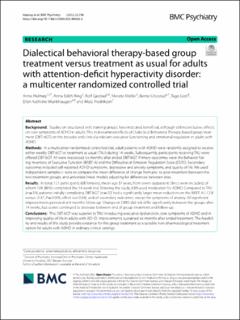| dc.contributor.author | Halmøy, Anne | |
| dc.contributor.author | Ring, Anna Edit | |
| dc.contributor.author | Gjestad, Rolf | |
| dc.contributor.author | Møller, Merete | |
| dc.contributor.author | Ubostad, Bente | |
| dc.contributor.author | Lien, Tage | |
| dc.contributor.author | Munkhaugen, Ellen Kathrine | |
| dc.contributor.author | Fredriksen, Mats | |
| dc.date.accessioned | 2023-01-10T13:31:09Z | |
| dc.date.available | 2023-01-10T13:31:09Z | |
| dc.date.created | 2022-12-01T09:07:54Z | |
| dc.date.issued | 2022 | |
| dc.identifier.issn | 1471-244X | |
| dc.identifier.uri | https://hdl.handle.net/11250/3042391 | |
| dc.description.abstract | Background
Studies on structured skills training groups have indicated beneficial, although still inconclusive, effects on core symptoms of ADHD in adults. This trial examined effects of Dialectical Behavioral Therapy-based group treatment (DBT-bGT) on the broader and clinically relevant executive functioning and emotional regulation in adults with ADHD.
Methods
In a multicenter randomized controlled trial, adult patients with ADHD were randomly assigned to receive either weekly DBT-bGT or treatment as usual (TAU) during 14 weeks. Subsequently, participants receiving TAU were offered DBT-bGT. All were reassessed six months after ended DBT-bGT. Primary outcomes were the Behavior Rating Inventory of Executive Function (BRIEF-A) and the Difficulties in Emotion Regulation Scale (DERS). Secondary outcomes included self-reported ADHD-symptoms, depressive and anxiety symptoms, and quality of life. We used independent samples t- tests to compare the mean difference of change from pre- to post-treatment between the two treatment groups, and univariate linear models adjusting for differences between sites.
Results
In total, 121 participants (68 females), mean age 37 years, from seven outpatient clinics were included, of whom 104 (86%) completed the 14-week trial. Entering the study, 63% used medication for ADHD. Compared to TAU (n = 54), patients initially completing DBT-bGT (n = 50) had a significantly larger mean reduction on the BRIEF-A (-12.8 versus -0.37, P = 0.005, effect size 0.64), and all secondary outcomes, except for symptoms of anxiety. All significant improvements persisted at 6 months follow-up. Change on DERS did not differ significantly between the groups after 14 weeks, but scores continued to decrease between end of group-treatment and follow-up.
Conclusions
This DBT-bGT was superior to TAU in reducing executive dysfunction, core symptoms of ADHD and in improving quality of life in adults with ADHD. Improvements sustained six months after ended treatment. The feasibility and results of this study provide evidence for this group treatment as a suitable non-pharmacological treatment option for adults with ADHD in ordinary clinical settings. | en_US |
| dc.language.iso | eng | en_US |
| dc.publisher | BMC | en_US |
| dc.relation.uri | https://link.springer.com/content/pdf/10.1186/s12888-022-04356-6.pdf?pdf=button | |
| dc.rights | Navngivelse 4.0 Internasjonal | * |
| dc.rights.uri | http://creativecommons.org/licenses/by/4.0/deed.no | * |
| dc.title | Dialectical behavioral therapy-based group treatment versus treatment as usual for adults with attention-deficit hyperactivity disorder: a multicenter randomized controlled trial | en_US |
| dc.type | Journal article | en_US |
| dc.type | Peer reviewed | en_US |
| dc.description.version | publishedVersion | en_US |
| dc.rights.holder | Copyright 2022 The Author(s) | en_US |
| dc.source.articlenumber | 738 | en_US |
| cristin.ispublished | true | |
| cristin.fulltext | original | |
| cristin.qualitycode | 2 | |
| dc.identifier.doi | 10.1186/s12888-022-04356-6 | |
| dc.identifier.cristin | 2086624 | |
| dc.source.journal | BMC Psychiatry | en_US |
| dc.identifier.citation | BMC Psychiatry. 2022, 22, 738. | en_US |
| dc.source.volume | 22 | en_US |
| dc.source.issue | 1 | en_US |

